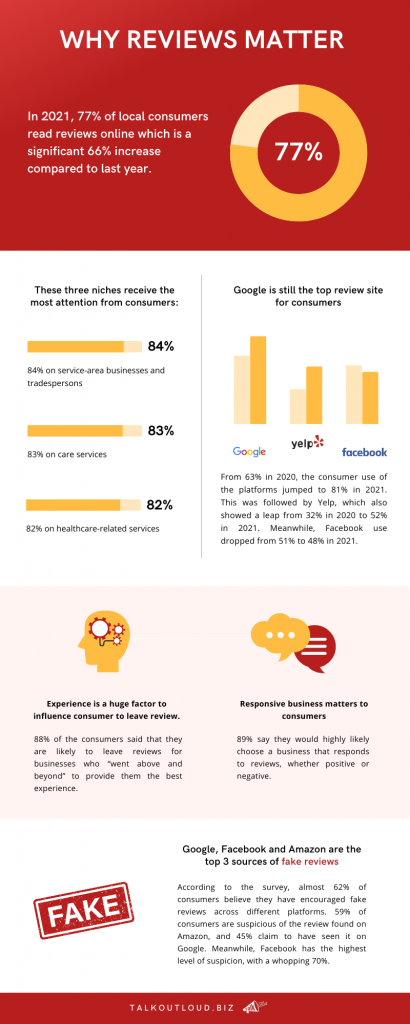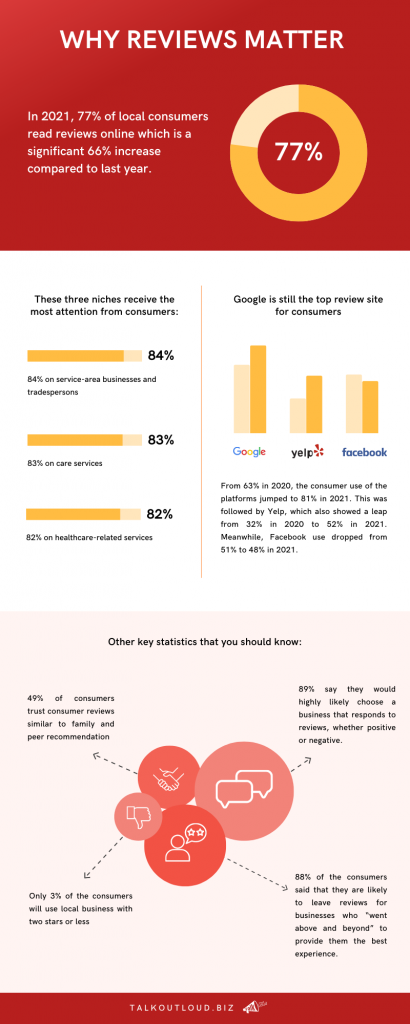Business reviews are one of the most powerful tools to highlight its authenticity, credibility, and legitimacy in the market. It also plays an important role in influencing other consumers’ purchasing decisions.
It also provides insightful data on consumer preferences and experiences. This gives businesses a better idea of the direction of the improvements that they should make.
In this article, we will explore the 5 most important top local consumer review trends from Bright Local’s survey of 1,124 US-based consumers.
Let’s start.
Consumers heavily rely on reviews found online
With the prevalence of the eCommerce industry today, online reviews become a staple resource for consumers. It allows them to evaluate the veracity and quality of services a business can provide.
In Bright Local’s recent local consumer survey, it shows that 77% of local consumers read reviews online which is a significant 66% increase compared to last year. Over 98% read online reviews for local businesses.
These three niches receive the most attention from consumers:
- 84% on service-area businesses and tradespersons
- 83% on care services
- 82% on healthcare-related services
Google is still the top review site for consumers

Everyone has a platform that they consider reliable to evaluate online reviews. These review platforms significantly help empower consumers to make their purchasing decisions. Thus, for businesses to continuously thrive in the market, it is a must for them to gather customer reviews on their products.
In the survey, Google still remains the highest and most used by consumers to assess business products and services. From 63% in 2020, the consumer use of the platforms has jumped to 81% in 2021. The increase comes as no surprise as Google is the largest and most popular search engine platform on the web.
This was followed by Yelp, which also showed a leap from 32% in 2020 to 52% in 2021. Meanwhile, Facebook use dropped from 51% to 48% in 2021.
With these statistics in mind, businesses should keep in mind to explore different strategic approaches. They should now only rely on the biggest platform but also the other potential platforms to maximize their growth.
Experience is a huge factor to influence consumers to leave a review
Good and bad experiences play a huge impact on the attitude of consumers toward their drive to leave reviews.
In the survey, 88% of the consumers said that they are “likely” or “highly likely” to leave reviews for businesses that “went above and beyond” to provide them with the best experience. Meanwhile, 74% will leave a review for family-owned businesses. And 77% are willing to leave a review for new business ventures.
Interestingly, 73% of the consumers would leave a review for businesses that they think didn’t deserve low ratings. This implies that companies with negative reviews can turn the tables by making adjustments to their services aimed at improving the consumer experience.
Responsive business matters to consumers
When evaluating reviews, more than half of consumers stated that business owners who respond to reviews make them feel good about the company.
In fact, 89% say they would “fairly or highly likely” choose a business that responds to reviews, whether positive or negative. While 57% say they are unlikely to transact with a business that is unresponsive to reviews.
There are also about 22% of the respondents who are “not likely at all” to choose a business that does not respond to negative reviews.
Although positive reviews also play a crucial role to influence consumer purchasing decisions, businesses should also give time to respond to business. This implies that consumers prefer responsive businesses that strive to improve negative experiences.
Google, Facebook and Amazon are the top 3 sources of fake reviews
As the eCommerce industry gets bigger, so does the competition. And while it grows, the more prevalent fake reviews grow.
According to the survey, almost 62% of consumers believe they have encouraged fake reviews across different platforms. With that in mind, it is vital for many platforms to increase their effort to filter fake reviews and improve customer experience.
59% of consumers are suspicious of the review found on Amazon, and 45% claim to have seen it on Google. Meanwhile, Facebook has the highest level of suspicion, with a whopping 70%.
Here are the factors that consumers consider fake reviews.
- 45% say that “over-the-top praise”
- 40% say that if the reviews have a similar content
- 38% say that the reviewer has an anonymous or suspicious name
Other key statistics that you should know:
- 49% of consumers trust consumer reviews similar to family and peer recommendation
- Fake reviews and fake reviewers made 67% of consumers skeptical of online reviews
- In the last 12 months, over 74% of consumers reviewed local business
- Only 3% of the consumers will use local businesses with two stars or less
- 7% of consumers are not suspicious of reviews found on Facebook
- 34% of consumers only leave positive reviews
- Trustpilot is the least used platform to evaluate reviews with 7%
- Online reviews on local businesses are read “occasionally” by 98% of consumers
Online reviews are essential for any business that wants to grow in a sustainable way. For a business to thrive, it is critical not only to increase visibility and rankings but also to establish credibility online. Given this, businesses should constantly strive to develop and improve their services geared toward providing customer satisfaction.








